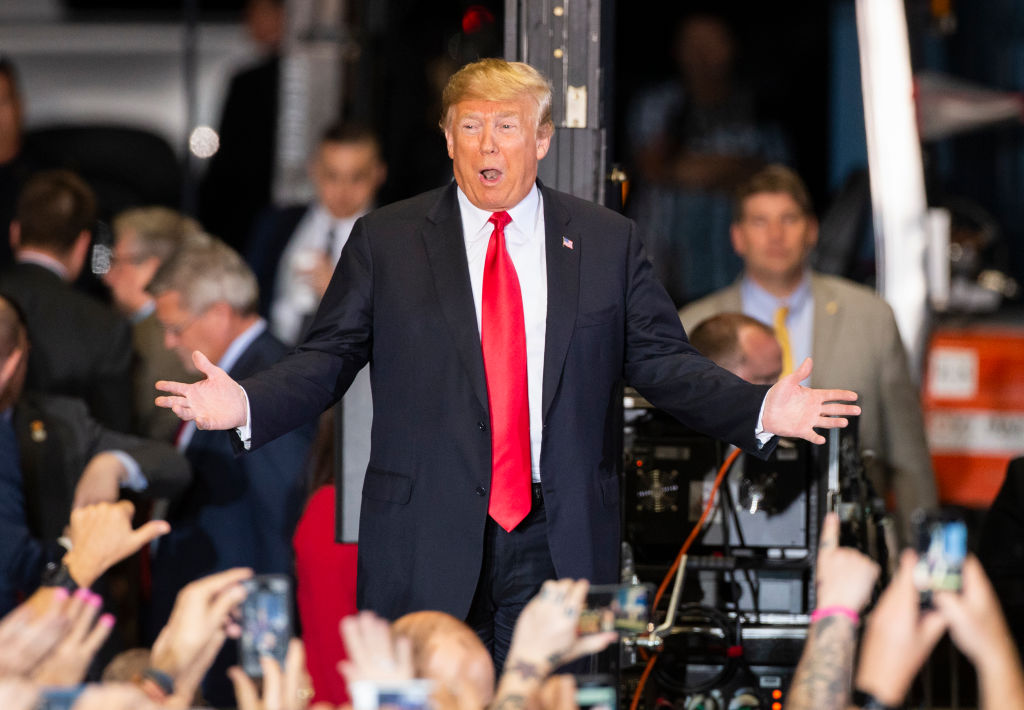Friday brought boffo news for the Republicans, just four days before the midterm elections that will determine if the party keeps control of both chambers of Congress. The Wall Street Journal succinctly captured the story: ‘Wages Rise at Fastest Rate in Nearly a Decade as Hiring Jumps: Unemployment rate held at a 49-year low in October; wages increased 3.1%.’ As the story went on to explain, a few factors converged to paint a particularly positive economic picture last month. ‘Employers shook off a September slowdown to add 250,000 jobs to their payrolls in October, above monthly averages in recent years, the Labor Department said Friday. With unemployment holding at 3.7 percent, a 49-year low, and employers competing for scarce workers, wages increased 3.1 percent from a year earlier, the biggest year-over-year gain for average hourly earnings since 2009.’
The economy, of course, has been performing quite well since Donald Trump became president nearly two years ago. So why haven’t Republicans been talking about it? Those running to hold or grab seats in the midterms barely bring up one of the only unalloyed successes of the administration. It’s particularly puzzling as congressional Republicans desperately worked to pass a tax cut package at the end of last year, knowing they needed one major legislative success they could point to in the midterms after their repeated failures to fulfill years of promises to repeal Obamacare.
Might we now see GOP strategy shift as the campaign reaches its final stretch? The latest economic news is a big boost, after all, as it dents the Democratic talking point that the average American worker, despite the high employment rate, isn’t seeing enough of the gains.
Don’t count on it. Republican rank and file take their orders from the top. And the leader of the party clearly isn’t interested in concentrating voters’ minds on his accomplishments.
‘They all say, “Speak about the economy, speak about the economy,”’ President Trump said Friday afternoon at a rally in West Virginia. ‘Well, we have the greatest economy in the history of our country. But sometimes it’s not as exciting to talk about the economy.’
No, what president would want to gush about the good he might have done for Americans of all stripes as voters consider what sort of Congress they think he should face for the rest of his term? Progressive Democrats are on the ascendant and members of the Democratic Socialists of America, such as New York’s Alexandria Ocasio-Cortez and Michigan’s Rashida Tlaib, will enter the House of Representatives that even Trump thinks will flip to Democratic control. But, other with than the occasional use of the hashtag #JobsNotMobs, the president won’t warn voters that the economy could be at stake next week.
‘Between Justice Kavanaugh and the caravan, you people are energized,’ Trump told the crowd at a rally he held later on Friday, in Indiana. His words echoed those of Lindsey Graham earlier in the week; the senator declared on Sean Hannity’s Fox News Channel show, ‘Kavanaugh and the caravan: If you’re a Republican and you’re not excited about voting, you’re legally dead.’
‘Excited’? Republicans, especially a certain strain of them, might be fired up and more interested in getting to the polls after watching a more-than-contentious Supreme Court confirmation fight and hearing many Democrats call for the dismantling of the agency that enforces immigration law in the country. But ‘excited’ isn’t the word I’d use for such sentiment, and it certainly isn’t the sentiment the president and most candidates of his party are trying to invoke in voters.
Trump’s motto was — and remains, despite the successes he might trumpet — ‘Making America Great Again.’ This wasn’t an optimistic call for Americans to get excited about building a better future. It was based primarily on the sort of emotions that do often get people to the polls: fear and anger. Trump laid this out in his campaign kickoff in June 2015, and he’s emphasizing the same themes years later, when he could instead talk about his administration’s accomplishments.
‘Our country is in serious trouble,’ Trump declared near the beginning of his first campaign speech. He explained what he saw as the problem, and it wasn’t big government trampling the entrepreneurial spirit of Americans dreaming of independence and prosperity. ‘We don’t have victories anymore. We used to have victories, but we don’t have them. When was the last time anybody saw us beating, let’s say, China in a trade deal? They kill us,’ he said. ‘When did we beat Japan at anything? They send their cars over by the millions, and what do we do? When was the last time you saw a Chevrolet in Tokyo? It doesn’t exist, folks. They beat us all the time.’
The most famous section of the speech was an even more direct appeal to negative emotion. ‘When Mexico sends its people, they’re not sending their best,’ he said. ‘They’re sending people that have lots of problems, and they’re bringing those problems with us. They’re bringing drugs. They’re bringing crime. They’re rapists.’
Three and a half years later, after winning the presidency and putting his own policies into practice, Donald Trump is campaigning the same way he did then, using most of the same tropes. He thought his Friday rallies would be boring — and maybe he was right — if he focused on the roaring economy and the likelihood Americans will see it and their fortunes fall if they elect Democrats next week. In Indiana, talking up Senate candidate Mike Braun against the Democratic incumbent, he sneered, ‘It’s no surprise that Joe Donnelly is holding a rally this weekend with Barack H. Obama.’ It wasn’t a dig at Obama’s economic policies; Trump emphasized the ‘H,’ which stands for Hussein.
It’s seemed strange for months that the president has not only declined to focus on the good news for which he might take credit but actively buried it in the headlines by regularly bringing up his own political problems. But Trump didn’t win by playing up the positive or the practicalities. His savvy strategy was to appeal, as much of celebrity culture does, to the passions. It worked — to the surprise of pundits and politicos across the Eastern Seaboard — in a presidential election held after years of mediocre growth and us-versus-them politics. People often vote based on their pocketbooks while an incumbent president is in power, and Republicans certainly campaign that way when they can. But Trump has not been a Republican for long, and he’s never let policy get in the way of passion. He must be confident that his instincts will lead him to pull off another upset — though his hints that he won’t be to blame if Democrats wrest control of the House suggest he’s not quite as self-assured as he acts.


















